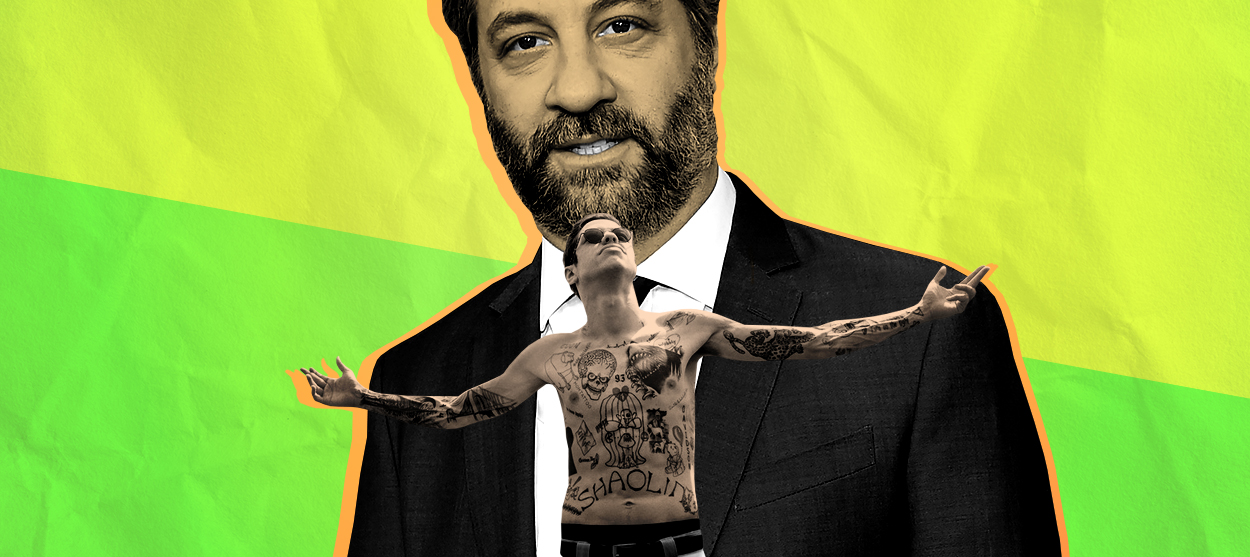Judd Apatow gets lost again
The King of Staten Island is yet another muddled slog from the comedy hitmaker


A free daily email with the biggest news stories of the day – and the best features from TheWeek.com
You are now subscribed
Your newsletter sign-up was successful
The history of film directors pivoting from comedy to drama is a long and checkered one. Woody Allen famously followed the Oscar-winning Annie Hall with the bleak Interiors, which was dismissed by critics as a pretentious embarrassment. Jay Roach, of the Austin Powers and Meet the Parents franchises, now directs political dramas, as does Adam McKay, who moved from Will Ferrell silliness to The Big Short and Vice. Todd Phillips, of Old School and the Hangover trilogy, wrote and directed Joker, during the promotion of which he declared comedy largely dead. "Go try to be funny nowadays with this woke culture," he Abe Simpsoned to Vanity Fair. "You just can't do it, right? So you just go, 'I'm out.'" Dubious rationale notwithstanding, the clown who longs to be taken seriously — from Charlie Chaplin to Robin Williams to Jim Carrey — has become a familiar cultural trope.
Unlike some of his former peers, the writer, director, and producer Judd Apatow isn't seen as having moved on from comedy; indeed, he's synonymous with it. Since 1999, when he executive-produced NBC's funny-sad Freaks and Geeks, much of the comedy landscape has been remade into a sprawling Apatowian exurb. In the mid-2000s, The 40-Year-Old Virgin and Knocked Up, both of which he wrote and directed, were huge hits, and his unofficial troupe — in part made up of Freaks and Geeks alumni like James Franco, Seth Rogen, and Jason Segel — seemed to be everywhere. In recent years, he's maintained relevance as a producer and writer for HBO's Girls and Netflix's Love — female-centered shows which smartly departed from his bromance-heavy résumé.
But as a writer/director, he has seemingly lost his way, edging ever deeper into a swamp of formless dramedy. Aside from 2015's Trainwreck — an Amy Schumer vehicle that she wrote herself — his post-Knocked Up filmography has been a series of maddening slogs. 2009's Funny People, despite starring Rogen and Adam Sandler, was a vague "bid at gravity, earnestness, adulthood, whatever," in the words of The New York Times; The Chicago Tribune described it as "an attempt by Apatow to reconcile the huge success he has become with the up-and-comer he once was… the results run an increasingly exasperating 2.5 hours." 2012's This Is 40 was even more scattershot, and just as endless; Slate compared it to "being condemned to watch two hours of someone else's home movies — overly long, self-indulgent, and bone-crushingly banal."
The Week
Escape your echo chamber. Get the facts behind the news, plus analysis from multiple perspectives.

Sign up for The Week's Free Newsletters
From our morning news briefing to a weekly Good News Newsletter, get the best of The Week delivered directly to your inbox.
From our morning news briefing to a weekly Good News Newsletter, get the best of The Week delivered directly to your inbox.
Apatow's latest is The King of Staten Island, released to video-on-demand services on Friday to a nation desperate for something new to watch. And though it is shrewdly being billed as coming "From the director of Trainwreck, Knocked Up, & The 40-Year-Old Virgin," it has far more in common with Funny People and This Is 40. It's yet another two hour-plus trudge that mistakes forsaking laughter with speaking some vital truth.
In many ways, The King of Staten Island is a departure for Apatow: it was written by him and its star, Saturday Night Live's Pete Davidson (and SNL writer and Davidson friend Dave Sirus), and it deals with the trauma that Davidson incurred when his father, a Brooklyn firefighter, died responding to the September 11 attacks. Davidson's mental health and drug abuse issues lie at the core of the film — it opens, cheerfully, with a suicide attempt — and as a chronicle of his struggle to find his way, it can feel unsettlingly real: Davidson has lived his entire life in the borough, where the film was shot, and to see his character, Scott, walk down a Staten Island street is to see Davidson do the same. Scott gazes sadly at his father's old dress uniform, sealed in plastic in the family garage, and gets high with a crew that includes Ricky Velez, another Davidson friend. "It all has to do with muscle memory and associating things with a place," Davidson told the Times. "All my troubles have been here, ups and downs with my family. When my dad passed, I was here."
This is wrenching stuff, and much of it does come through, lending The King of Staten Island an authenticity that Funny People and This Is 40 lacked. Marisa Tomei is typically excellent as Scott's yearning, big-haired mother, and Bill Burr brings pugnaciousness to the role of a much-needed father figure. Certain scenes — as when Scott tries to tattoo a nine-year-old boy on a forbidding spit of beach, or when Steve Buscemi, as a fire chief, tells Scott about his dad in a crowded bar — have a ground-level, lived-in feel. But these parts never add up to a satisfying whole, as Apatow remains bound to the episodic nature of his comedies. Scenes stack upon scenes, drama never builds, and every so often, something baffling happens — a botched burglary, a gut-shot Action Bronson staggering into a firehouse — to nudge the plot along. It's formally drawn out yet dramatically undercooked.
It's unfortunate, because The King of Staten Island is so obviously meaningful. Davidson has said that "filming it and digging deep and being in uncomfortable areas… helped me as a person," and that the movie was a gift to his mother, who is "a big hero of mine, just like my dad." The actor, best known for his "Weekend Update" pop-ins on SNL, has an undeniable magnetism, but as the film crawls along, that energy begins to wear. "You are so crazy that you make everyone around you feel f—ing crazy," Scott's sometimes-girlfriend, played by Bel Powley, screams. "They're normal people and then they hang out with you and then they're f—ing Jack Nicholson in The Shining." It's an overstatement, but still: he's not much fun to be around. Like The Joker, Scott is a wild-eyed side character who's been given an entire film — but where Phillips' blockbuster cribbed from Scorcese's Taxi Driver, The King of Staten Island follows the template of Apatow's lesser films.
A free daily email with the biggest news stories of the day – and the best features from TheWeek.com
In speaking about Interiors' reception, Woody Allen once said that "people were so shocked and so disappointed with me that I broke my contract with them, my implicit deal with them." His charge was that the public is too unimaginative to accept an established artist's growth. But while that might sometimes be the case, when it's done well — when Jim Carrey stars in The Truman Show or Ben Stiller directs Escape at Dannemora — that contract is rendered void. Good art is good art, regardless of maker or genre. But the public's contract with Judd Apatow has lost all clarity. We don't know what to ask of him because he seems unsure of what he's giving. "How can I make it real and have you feel like you're seeing something that's a little bit more documentary in style?" he said in a recent interview. "That's hard for me. That requires more discipline than I usually have." That much does seem clear. As Davidson's character likes to say, he's still figuring out his stuff.
Jacob Lambert is the art director of TheWeek.com. He was previously an editor at MAD magazine, and has written and illustrated for The Philadelphia Inquirer, Philadelphia Weekly, and The Millions.
-
 Key Bangladesh election returns old guard to power
Key Bangladesh election returns old guard to powerSpeed Read The Bangladesh Nationalist Party claimed a decisive victory
-
 Judge blocks Hegseth from punishing Kelly over video
Judge blocks Hegseth from punishing Kelly over videoSpeed Read Defense Secretary Pete Hegseth pushed for the senator to be demoted over a video in which he reminds military officials they should refuse illegal orders
-
 Trump’s EPA kills legal basis for federal climate policy
Trump’s EPA kills legal basis for federal climate policySpeed Read The government’s authority to regulate several planet-warming pollutants has been repealed
